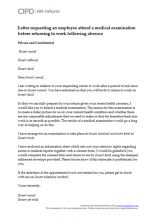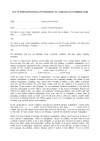It is common for Australian employers to want to ensure that potential hires or current employees returning after an injury are mentally and physically fit to do so. Employees must have the ability to perform the tasks that make up their job duties. While there are legitimate reasons for an employer to ask someone to take a medical test for work, there are also some legal risks associated with it.
An employee is not required to comply with your request to undergo a medical examination in all circumstances, and may even have a claim against you if you make an inappropriate demand to undergo a medical examination.
Whether requiring a medical test for work is appropriate or not is going to depend upon the specific circumstances of the job you are offering, and the employee’s current situation. It is always a good idea to get employment legal guidance before you go forward with a request or a demand to one of your workers. Owen Hodge Lawyers can provide insight into when and why you should and should not ask an employee to undergo an exam, and can help you to put together a pre-employment medical check up letter if necessary.
Sample Letter Requesting That an Employee Attend a Medical Examination
To find a sample letter requesting that an employee attend a medical examination prior to returning to work, we recommend the following links:
When Can You Ask an Employee to Undergo a Medical Examination?
Employers must be careful when requesting a pre-employment screening, or when asking an employee to submit to a medical examination as a condition of returning to work. There is the potential for legal liability for requesting or requiring pre employment medical examinations. But employers also need to ensure they do not risk having a worker get hurt because he/she is physically unfit for work tasks. Employers must carefully balance the possibility of a Fair Work Commission complaint versus the risk of a workplace injury.
There are certain situations in which there is a lawful basis for employers to submit a pre-employment medical check up letter. In these scenarios, it is acceptable – even advisable – for an employer to ask a potential or current worker to see a medical practitioner for an examination. These include:
- To determine the employee is able to perform the job duties that are an essential part of the job he/she is being hired to do.
- To understand the nature and extent of a current/potential employee’s disability in order to understand what accommodations an employer must provide so the worker is able to complete job tasks.
- To identify current or future risks to the health and safety of the applicant or employee in order to establish appropriate risk prevention measures and to comply with duties under occupational health and safety laws.
- To reduce expenditures associated with lost productivity, sickness absence, and staff turnover associated with employee illness.
- To determine superannuation entitlements and insurance coverage.
- After an employee has experienced a significant absence from work due to a health condition and then fails to provide appropriate medical documentation approving their return to work.

Before Sending Your Return To Work/Pre Employment Medical Check Up Letter
It’s always a good idea to check with an employee rights lawyer before submitting a pre-employment medical check up letter.
The Disability Discrimination Act 1992 states that employers must not discriminate against potential workers on the basis of disability, or consider disability status when setting their employment terms and conditions. Disability is defined broadly to include pre-existing conditions, current conditions, and conditions that may exist in the future.
However, the Act does allow an “exemption”. An employer may consider a disabling condition as a deciding factor if it would make it impossible for the employee to carry out the inherent requirements of the job – even after reasonable adjustments for the worker being made.
An employer may also consider disability in situations where allowing the worker to perform job tasks would constitute an “unjustifiable hardship” on other workers. An unjustifiable hardship might exist if adjustments have been made to accommodate the employee’s disability, which have then had a detrimental effect on staff, clients, or the organisation as a whole.
Employers have also been found justified in demanding a medical report from employees who provided insufficient documentation or inadequate support for a medical certificate attesting to fitness for work. Reasonable concerns about the fitness of a worker could arise if an employee is absent from work for an extended period, and then returns unannounced after the absence or provides limited or no medical information upon returning. The higher the risks associated with the work that the employee does, the greater the justification for an employer to request a medical test for work.
Whether making a request before a worker has been hired, or asking a current employee to undergo a medical assessment, employers should be sure they have a legitimate reason to ask for a health assessment; they should also be certain to fully explain to the worker why the request is being made. By providing strong justification in the pre-employment medical check up letter, especially when the medical examination is intended to protect the employee, an employer can reduce the chances of having a claim made against them.
To learn more about asking an employee to undergo a medical examination, and to get advice on how to handle an employee’s refusal to take an examination or medical results showing an employee is unfit, contact OHL Lawyers at 02 8315 4034 or contact us via ohl@owenhodge.com.au to schedule a free consultation with one of our experienced employment lawyers.
At Owen Hodge Lawyers, we always strive to provide you with the best legal advice and guidance – no matter your issue. We specialise in a range of law matters, and have a blog that offers in-depth and comprehensive articles. Read about genuine redundancy and much more on the Owen Hodge blog today.


